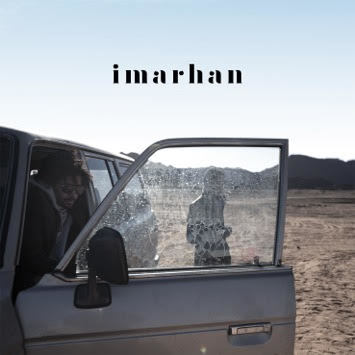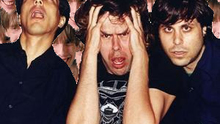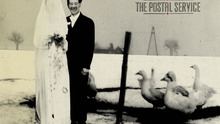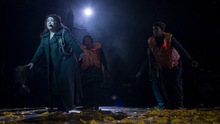9Bach sing in Welsh, and so they’re often thought of – pretty much by default – as being a band which plays Welsh folk. All music in ancient or indigenous languages is folk music, right? But in contrast to something like their Welsh language peer The Gentle Good, 9Bach have always slightly eschewed this description, without ever properly shaking it off. Sure, they have a harp. And sure, there are some very explicit folk influences. Yet their music subtly pushes itself beyond these frameworks; bringing in trinkets of sound from psych, rock and beyond. Never has this been more obvious than on their newest record Anian.
Anian doesn’t just travel through genres, it actually travels the map. ‘Cyfaddefa’ builds to a visceral, rolling climax of melody and rhythm from the Middle East. The opening notes of the following track ‘Brain’ drift further eastwards still. These are deliberately bold moves from a band who more often take a subtler approach to peppering their arrangements with influences beyond their obvious folk parameters.
Elsewhere, their less-is-more approach to their instrumentation pays off as handsomely as ever, while also becoming bolder and further ranging. They’re a full band, with a range of multi-instrumentalists, but they don’t succumb to a kitchen sink approach. Many of these tracks are sparse, leaving lots of space around single, resonant piano chords, or shy plunks of harp. Coupled with their tight, restrained rhythm section, the effect can be similar to something like present day Portishead – taking the melancholy and sinister feel of mid 90s trip hop – using little bass runs and tiny melodic flourishes like samples – and replicating it with rich, live instrumentation.
Sadly, their most ambitious move on Anian is also their greatest failure. The seven minute ‘Si Hwi Hwi’ builds from a repeated lick of vocal, and seeks to soar to a mesmeric swirl of sound, not unlike an album highlight from their previous album Tinician. It begins with intrigue, but squanders any sense of structure or melody by its halfway point. A few harmonic tricks in its back end don’t save it from being an indulgent misstep, and one which comes oddly early in the record, derailing the album’s subtle momentum. From here – with a full six tracks to go – it’s hard for the record to do anything but drift, and it does.
One of 9Bach’s greatest strengths remains their vocalist Lisa Jen, and the breathy versatility of her voice. Even when the album meanders, she always interacts well with the fragile arrangements of her band, and always provides an anchorage of sorts. She can dance through a falling falsetto with confidence – just listen to the way she wraps her voice around itself in harmonic syncopation at the close of the title track. And that’s not to mention how gracefully she delivers the unique sounds of the Welsh alphabet.
The vocals, arrangements and performances are as strong as ever, but it’s hard to shake the feeling that Anian suffers from some odd pacing decisions. Why frontload the deepest psych influences to the first few tracks? Why put something as indulgent as ‘Si Hwi Hwi’ so early on in the record? Why then suddenly decide to lurch into wider world music? These are choices from which Anian struggles to recover, no matter how charming and intricate the arrangements frequently are. In concert, the results of these expanded horizons will sit among an enhanced and emboldened set list. On record, though, this feels an uneven entry; too self-conscious in its attempt to transcend the expectations of contemporary Welsh language music.
-
6Russell Warfield's Score























